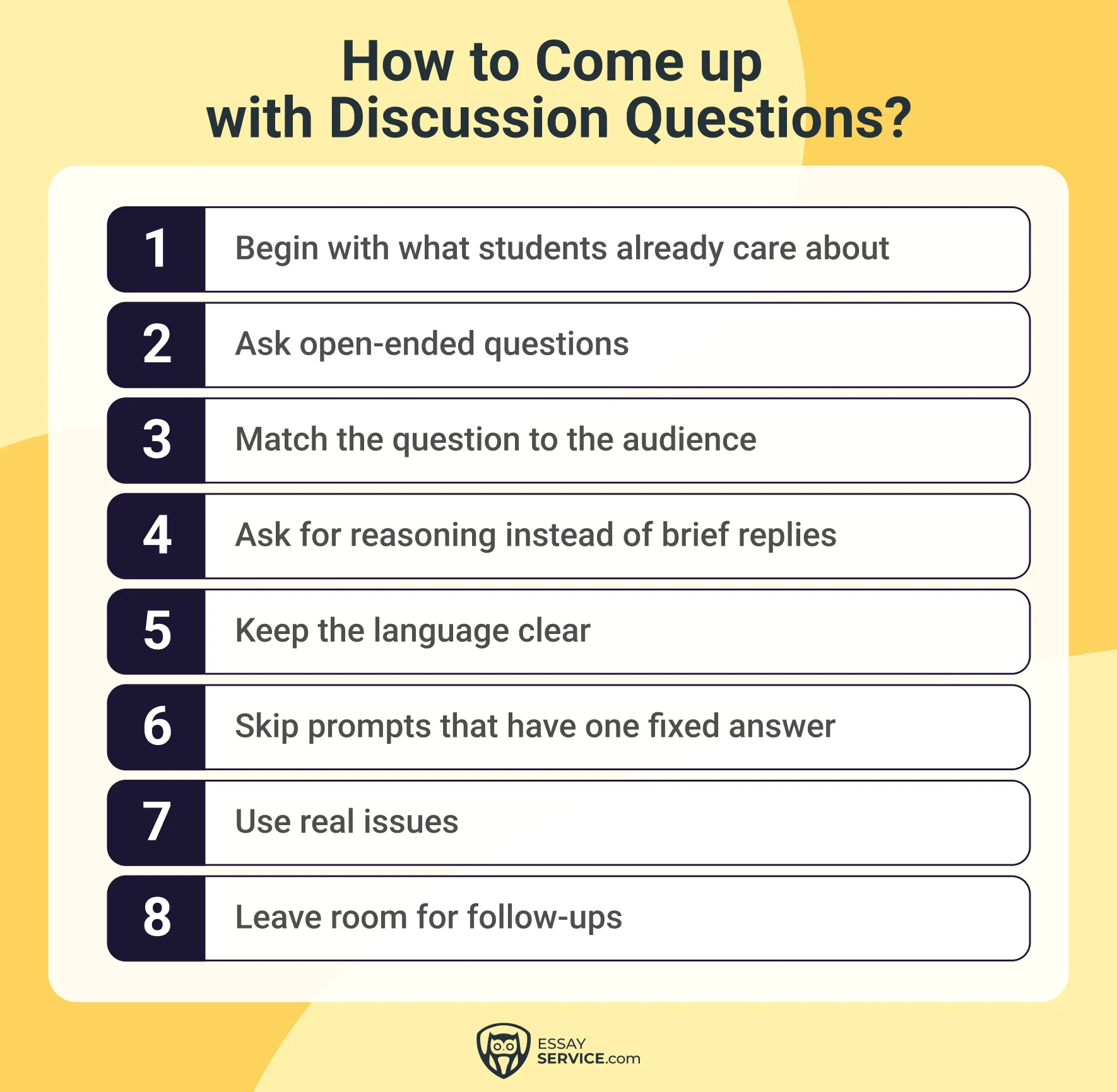Good classroom discussions get students thinking, reacting, and connecting ideas out loud. The right questions can turn a quiet room into a space buzzing with curiosity and opinions. In this article, you’ll find the list of discussion questions examples for students that spark genuine thought and keep conversations moving in new directions.
And if you ever need help shaping your ideas into a clear post or paper, don’t bother asking ‘who can write my discussion post?’ Just know that EssayService’s professionals are always ready to step in and lend a hand!

Discussion Questions for Elementary School Students
Younger students question everything because they are curious by nature. Discussion prompts channel that curiosity into learning. With the questions below, you'll help them start to see how the world works.
- Should schools give kids more recess time?
- Is weekend homework fair for students?
- Should each class have a pet?
- Would life be easier if robots did chores?
- Should students pick their own seats?
- Do video games help kids learn?
- Should everyone learn an instrument?
- Should school start later in the morning?
- Should students wear uniforms?
- Should kids be allowed to eat pizza every day?
- Should all students learn a new language?
- Is it right to keep animals in zoos?
- Should kids choose their school lunches?
- Should summer break be shorter?
- Should schools celebrate all holidays?
Discussion Questions for High School Students
By the time students reach high school, their opinions sharpen. They start forming their own worldview and start questioning the bigger issues, such as authority and social injustices. Good discussion questions give that energy direction and help teens learn how to stand up for what they believe.
- Should social media apps limit teen screen time?
- Is it fair if AI grades schoolwork?
- Should teens work after school?
- Are online friendships real?
- Should 16-year-olds vote?
- Do schools need dress codes?
- Should mental health days be excused?
- Should schools teach money skills?
- Do schools teach enough about climate change?
- Should colleges drop the SAT?
- Do influencers affect students more than teachers?
- Should online privacy laws be stronger?
- Does competition help students learn?
- Should students grade teachers?
- Should every student get free tech access?
Discussion Questions for College Students
College comes with tougher questions and, consequently, sharper debates. Students are already part of a wider world where some answers seem to lead to even more questions. College discussions teach us to look at an idea from all sides and see what truths and contradictions we'll find inside it.
- Should colleges ban facial recognition on campus?
- Can universal basic income really work?
- Should governments control how AI is used in schools?
- Can free healthcare be fair for everyone?
- Should college athletes get paid?
- Is it right to use AI for writing essays?
- Should we invest more in renewable or nuclear energy?
- Are social media apps to blame for mental health problems?
- Should everyone be required to vote?
- Can people still have privacy online?
- Should governments fund art more than sports?
- Does facial recognition take away personal freedom?
- Should education be free for all countries?
- Do algorithms shape how we think and choose?
- Is it right for companies to sell user data?
Discussion Questions by Subjects
Every subject opens a different way of thinking. When students explore ideas within a familiar context, they easily discover how interesting topics to discuss with students shape understanding.
Literature Discussion Questions
The emotions that fill our favorite books often mirror what we feel and experience in real life. These prompts will help you think about how we connect to stories and why certain tales stay with us for years.
- What makes an ending feel right or wrong?
- Should books always teach something?
- Can a villain ever be good?
- Does reading fiction make people kinder?
- Should schools read more modern authors?
- What gives a book lasting power?
- Can readers change a story's meaning?
- Do movies ruin or improve books?
- Should banned books be allowed in schools?
- How much should an author's life matter when reading their work?
History Discussion Questions
Discussions about the past help students see how certain decisions ripple through generations. These open-ended questions encourage reflection on how we interpret history and what responsibilities come with remembering it.
- Can history ever be told fairly?
- Should old statues stay or be removed?
- Do small events shape big changes?
- Is war ever truly needed?
- Should schools teach more about local history?
- How do everyday people change history?
- Does technology change what we know about the past?
- Can mistakes repeat if we don't learn from them?
- Should nations say sorry for past harm?
- What makes a person worth remembering?
Science Discussion Questions
Science begins with curiosity, not certainty. The questions below open a space for discovery and, inevitably, some disagreement. The goal is to question how that knowledge influences our lives.
- Should humans ever be cloned?
- Can science fix every problem?
- Should countries share space research?
- Are all inventions good for people?
- Should lab-grown meat replace animal meat?
- Can faith and science work together?
- Should risky research be public?
- Do people depend too much on technology?
- Should schools add more experiments?
- Is curiosity more important than facts?
Ethics Discussion Questions
Ethics brings us into the gray areas, where right answers rarely come easy. These discussion question ideas ask students to find answers through honesty and self-awareness.
- Is it ever okay to lie?
- Should helping others come before yourself?
- Can revenge be right?
- Do animals deserve equal care as people?
- Should companies pay for polluting?
- Is honesty always best?
- Should forgiveness have limits?
- Can technology be moral or immoral?
- Should we judge by what people do or mean to do?
- Is silence wrong when someone is hurt?
Art Discussion Questions
Art reaches places where logic can't. Talking about art helps students practice seeing the world differently. These prompts give space for creative ideas and open-ended reflection without expecting one right answer.
- What makes something art?
- Should art always say something clear?
- Is digital art as real as painting?
- Should public funds support art?
- Can anyone become an artist?
- Does popularity change meaning?
- Should stolen art be returned?
- Is graffiti a kind of art?
- Does knowing the artist change the work?
- Should art have limits?
Discussion Questions on Different Topics
Conversations in class feel more natural when they connect to everyday life. These interesting topics to discuss with students encourage them to express their opinions and listen to others.
Discussion Questions about Hobbies
Discussions about hobbies show what keeps students motivated. These student discussion questions also encourage them to learn about each other's interests.
- Should schools give free time for hobbies?
- Can hobbies turn into jobs later?
- Do hobbies help people relax?
- Should schools support all kinds of clubs?
- Are online hobbies good for learning?
- Should teachers share their hobbies in class?
- Do group hobbies build teamwork?
- Can collecting things be useful?
- Is it better to have one hobby or many?
- Should hobbies be part of school grades?
Discussion Questions about Technology
Technology has influenced every single aspect of our lives for years. Talking about this helps us think about what it changes and how much of it is useful.
- Should phones be used in class?
- Can screens replace books?
- Does social media help people connect?
- Should everyone learn coding?
- Do online friends feel real?
- Can too much screen time cause harm?
- Should AI help teachers grade work?
- Does technology make people forget faster?
- Should schools teach digital safety?
- Can life work without technology now?
Discussion Questions about Family
Family gives foundation to everything that follows. It's where we grow and learn to make choices. These questions will help students reflect on relationships and respect.
- What makes a family strong?
- Should family members eat together often?
- Do rules at home help children learn?
- Should chores be shared equally?
- Do family traditions matter?
- Can pets count as family?
- How can family help during stress?
- Should parents let kids make choices?
- Can disagreements make families closer?
- What makes family time special?
Discussion Questions on Education
Education affects how people think and plan their future. Discussing it helps students question what works well and what could be better. These education questions for discussion encourage students to see learning as something they can shape themselves.
- Should the school year be focused on creativity?
- Do grades show real learning?
- Should all students study for free?
- Do uniforms help learning?
- Should students help make school rules?
- Can online learning replace classrooms?
- Should students pick subjects earlier?
- Do teachers get enough respect?
- Should homework be optional?
- What makes a classroom feel right for learning?
Discussion Questions on Emotional Learning
Emotional learning helps students manage their feelings better. Talking about it builds awareness and helps them care about others.
- Should schools teach emotions and empathy?
- Can kindness be learned?
- Should teachers discuss feelings in class?
- Do emotions change how people learn?
- Can students support lonely classmates?
- Should schools offer emotional help programs?
- Is talking about failure useful?
- Do group projects build trust?
- Can self-control be taught?
- What makes a person emotionally strong?
Good Discussion Questions Examples
Every meaningful discussion starts with a meaningful question. And it doesn't necessarily mean complicated. All that matters is that the question invites more than one answer. These examples can guide clear argumentative communication.
- Should students pick their own subjects?
- Does kindness really make a difference?
- Should the school year include more time outdoors?
- Do people learn better by doing or reading?
- Should everyone have to vote?
- Can money make people happy?
- Should school start later in the day?
- Do grades push students or cause stress?
- Can computers replace teachers?
- Should art be part of every school program?
- Do uniforms make students feel equal?
- Can small acts change the world?
- Should kids have age limits on social media?
- Do people learn more from mistakes than from success?
- Should schools teach real-life problem-solving?
Fun Discussion Questions for Students
Lighter topics often bring out honest thoughts. Fun questions help them speak freely while learning how to express opinions in a group.
- If you could live anywhere, where would you go?
- Would you rather fly or turn invisible?
- What would school be like with no rules for a day?
- Which movie character would make a great teacher?
- What song makes you feel better instantly?
- If animals talked, which one would be the funniest?
- What new invention would make life easier?
- If you had a time machine, where would you travel first?
- Would you rather explore space or the ocean?
- What food could you eat every day and never get bored with?
- If you could trade lives with anyone, who would you choose?
- What superpower would you want most?
- How would your dream school look and feel?
- Would you enjoy living in the city or in a quiet town?
- What would your perfect weekend include?
How to Come up with Discussion Questions?
Good discussion questions start with observation and intent. They are built from what students think about, not what teachers expect them to repeat. A strong question sounds natural when spoken and leaves space for reasoning. Here's where you can start:

- Begin with what students already care about. When a topic feels engaging, participation comes naturally.
- Ask open-ended questions, not just yes or no answers.
- Match the question to the audience. Younger students need focus and clarity, while older ones handle more complexity.
- Ask for reasoning instead of brief replies. A good discussion grows when students explain their thinking.
- Keep the language clear and easily understandable.
- Skip prompts that have one fixed answer. Discussion grows when students can see more than one side.
- Use real issues that tie into daily life.
- Leave room for follow-ups. A single "why" or "how" can turn a short answer into a full conversation.
Final Thoughts
Strong discussion questions help students think independently and express ideas with confidence. They make classrooms feel open and thoughtful, where each answer leads to another question. When learners listen and respond with care, they build communication habits that last beyond school.
If you need help turning any of these questions into a well-structured essay, EssayService's professionals can always take some pressure off your shoulders.
Frequently Asked Questions
What Are Discussion Questions?
Discussion questions are prompts that invite a debate. They ask students to think through ideas instead of memorizing information. A good one gives space for disagreement and personal interpretation.
What Are Some Good Discussion Topics for Students?
Strong topics connect to real experiences and leave enough room for debate. Here are five engaging ideas to get you inspired:
- Should schools shorten the school day?
- Do social media platforms change how friendships work?
- Should sixteen-year-olds be allowed to vote?
- Are school uniforms helpful or unnecessary?
- Does technology improve learning or distract from it?
Where to Find Unique Discussion Questions?
The best questions often appear in everyday life. They come from what students talk about or what sparks disagreement in class. Teachers can also pull ideas from short articles or casual conversations. The goal is to spot subjects that are worth talking about.
How to Make Good Discussion Questions?
Start by thinking about what would make someone stop and answer thoughtfully. Avoid long wording or topics with only one possible answer. Focus on phrasing that makes students explain or reflect instead of picking a side right away.
How to Answer Discussion Questions?
Begin with a direct opinion or thought, then explain why you see it that way. Add a short example to make the point clearer. Listen to others before replying again. A good answer keeps the exchange respectful and curious, showing that you understand different views even when you disagree.

Anna has been helping students become more productive learners for 20+ years now. Her experience, combined with a Master’s degree in psychology, ensures her blog posts contain only valuable insights.
- Discussion Question Activities | University of Illinois Springfield. (2025). https://www.uis.edu/. https://www.uis.edu/ion/resources/oiai/discussion-questions
- Designing Effective Discussion Questions. (n.d.). https://www.bu.edu/teaching-writing/files/2020/03/effectivediscussionquestions.pdf
- Effective Online Discussion Questions. (2025). Teaching and Learning Resource Center. https://teaching.resources.osu.edu/examples/effective-online-discussion
New posts to your inbox
Your submission has been received!



